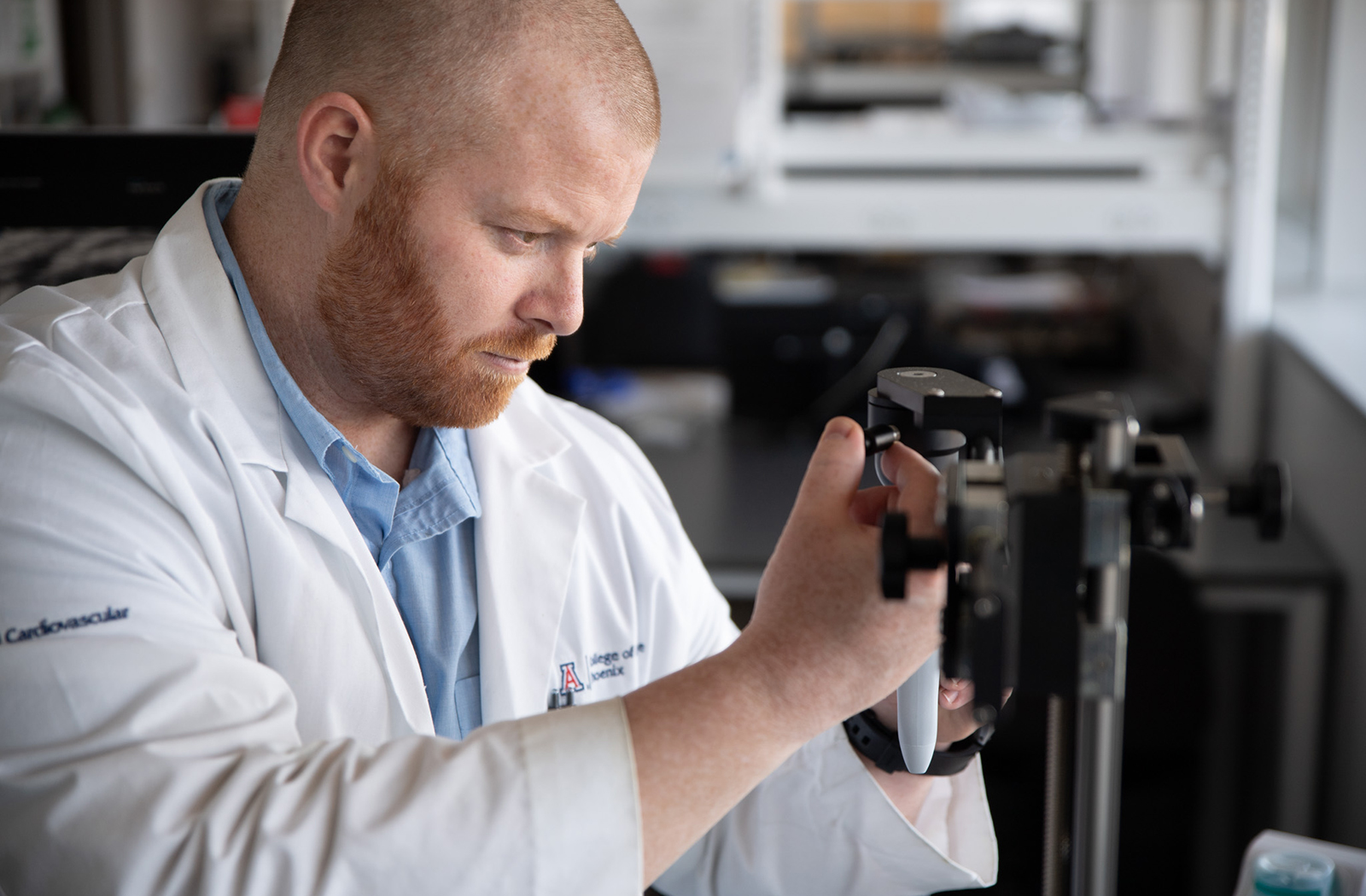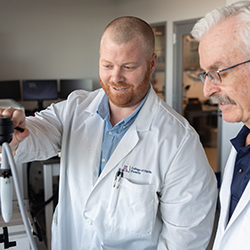
Erik Blackwood, PhD: Tackling A New Challenge in Heart Failure

The race to prevent heart failure is a marathon, but researchers are gaining on heart disease — the leading cause of death for men, women, and people of most racial and ethnic groups in the United States.
Erik Blackwood, PhD, research assistant professor in Internal Medicine, has dedicated his career to studying cardiovascular diseases, guided by his mentor Christopher Glembotski, PhD, who is now the director of the Translational Cardiovascular Research Center (TCRC). Having jointly moved to the TCRC in 2020, Dr. Glembotski's influence has significantly shaped Dr. Blackwood's career, particularly in understanding the stress response systems in the heart. Together, they have been examining the progression from initial stress to heart failure. Over the last decade, a shift has occurred in how heart failure is clinically recognized and how patients present with the condition.

Previously, the focus was on heart attacks and the classic forms of heart failure characterized by a progressive decline in the heart’s pumping function. However, with the increasing prevalence of obesity, diabetes and hypertension in the United States, a new challenge has emerged: heart failure with preserved ejection fraction (HFpEF).
Being called the greatest unmet need in cardiovascular medicine, 1 in 10 adults will develop HFpEF in their lifetime. Dr. Blackwood explained, "A standard way of assessing heart function is through ultrasound, where we can see the heart pump in real time. Ejection fraction essentially measures how much blood is pumped out of the heart with each heartbeat. A healthy ejection fraction is around 60 to 65%. In traditional heart failure, this number drops as the heart becomes less able to pump blood. However, in HFpEF, the heart maintains a normal ejection fraction but struggles to relax properly, like flexing a muscle continuously without releasing, eventually leading to muscle failure."
HFpEF is of particular concern in Arizona due to several factors. Phoenix, being the fifth largest city in the United States, exemplifies the obesity epidemic prevalent across the state. Patients often have comorbidities, such as kidney disease, liver failure, diabetes and pulmonary conditions, complicating their diagnosis and treatment.
Dr. Blackwood noted, "Arizona, particularly Phoenix, has a very pervasive obesity epidemic. Combined with the aging population, including many baby boomers, it creates a perfect storm for HFpEF. Age independently stresses the heart, and when combined with obesity, diabetes and hypertension, it leads to HFpEF. This condition has a staggering survival rate of just 35% — worse than many cancers — highlighting its severity and the urgent need for effective treatments."
Dr. Blackwood observed high levels of SGK1, an enzyme commonly studied in cancer research for its role in signaling pathways, in patients with HFpEF. "Under normal conditions, SGK1 helps the body respond to stress. However, when unchecked, it becomes pathological. We observed high levels of SGK1 in heart failure samples and HFpEF patients, giving us reason to study its role in disease progression and potential as a therapeutic target."
Dr. Blackwood and his team have been able to manipulate SGK1 specifically in the heart in mouse models, incorporating factors like aging, obesity, diabetes and hypertension.
“Our findings show that these mice are protected from becoming obese despite consuming a high-fat diet, suggesting that SGK1 might regulate weight gain and metabolic functions beyond the heart.”
Dr. Blackwood's research follows a two-pronged approach: understanding the molecular mechanisms of SGK1 and developing translational therapies. He discovered that SGK1 remains active in HFpEF due to impaired degradation. His team designed a peptide-based therapy that is showing promising results in targeting SGK1 for degradation.
Additional research is needed to test the peptide therapy in HFpEF conditions. Eventually, he hopes to apply for National Institutes of Health funding to advance this research toward clinical trials.
About the College
Founded in 2007, the University of Arizona College of Medicine – Phoenix inspires and trains exemplary physicians, scientists and leaders to advance its core missions in education, research, clinical care and service to communities across Arizona. The college’s strength lies in our collaborations and partnerships with clinical affiliates, community organizations and industry sponsors. With our primary affiliate, Banner Health, we are recognized as the premier academic medical center in Phoenix. As an anchor institution of the Phoenix Bioscience Core, the college is home to signature research programs in neurosciences, cardiopulmonary diseases, immunology, informatics and metabolism. These focus areas uniquely position us to drive biomedical research and bolster economic development in the region.
As an urban institution with strong roots in rural and tribal health, the college has graduated more than 1,000 physicians and matriculates 130 students each year. Greater than 60% of matriculating students are from Arizona and many continue training at our GME sponsored residency programs, ultimately pursuing local academic and community-based opportunities. While our traditional four-year program continues to thrive, we will launch our recently approved accelerated three-year medical student curriculum with exclusive focus on primary care. This program is designed to further enhance workforce retention needs across Arizona.
The college has embarked on our strategic plan for 2025 to 2030. Learn more.